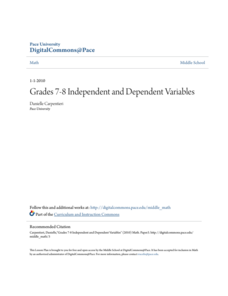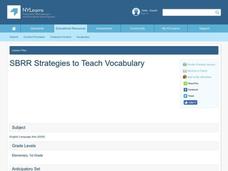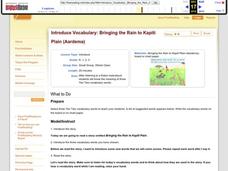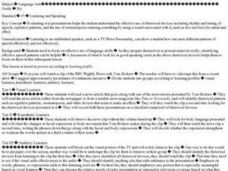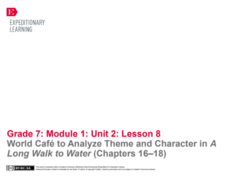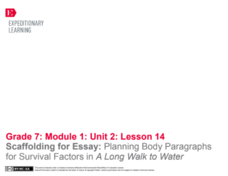Pace University
Grades 7-8 Independent and Dependent Variables
It all depends upon the independence. The differentiated instruction lesson introduces learners to independent and dependent variables. Using real-world situations, scholars gain a conceptual understanding of the difference between the...
Curated OER
SBRR Strategies to Teach Vocabulary
First graders use principles for learning useful, interesting and sophisticated words based on scientifically-based reading research. They expand their vocabulary knowledge of Tier 2 words through explicit, direct instruction.
Curated OER
Literary Response and Analysis
Students analyze the archetype of 'the fall' in Shakespeare's Macbeth. In this literary analysis lesson, students work in tiered learning groups to analyze the characters of Macbeth and Lady Macbeth. Students use the book of Genesis as...
Curated OER
Introduce Vocabulary: Clap Your Hands
Read Clap Your Hands to explore new vocabulary with your class. In this three-tiered vocabulary lesson plan, youngsters read the book and identify the plot, setting, and characters. They also define vocabulary terms from the book and...
Curated OER
Introduce Vocabulary: Bringing the Rain to Kapiti
Young scholars develop new word knowledge by reading a children's book in class. In this vocabulary lesson, students read the book Bringing the Rain to Kapiti Plain, and identify the use of three specific vocabulary words. Young scholars...
Curated OER
Introduce Vocabulary: Curious George Rides a Bike
Pupils explore language arts by reading a classic book in class. In this story vocabulary lesson plan, students read the book Curious George Rides a Bike and identify the use of specific vocabulary words. Pupils define the selected words...
Curated OER
Introduce Vocabulary: I See Animals Hiding
Students are introduced to the story " I See Animals Hiding" and define key vocabulary words from the story. In this lesson aimed at reinforcing vocabulary, students listen to the usage of vocabulary words in the story. Students...
Curated OER
SBRR Strategies to Teach Vocabulary
First graders explore reading comprehension by reading Curious George books in class. In this vocabulary expansion lesson, 1st graders read the book Curious George Takes a Job and analyze the easy vocabulary terms as well as "tier 2"...
Curated OER
Describing a Story Event or Character
First graders discuss story events and characters. In this story event or character lesson, 1st graders work in tiered groups to read George Ella Lyon's, Together. They complete reading the story before talking about their favorite...
Curated OER
Evaluating Oral Presentation
Sixth graders examine the use of rhetorical devices in oral presentations. In this rhetorical device lesson, 6th graders watch a newscast of a major TV news personality to observe how speech patterns and rhythms are used effectively....
Curated OER
Introduce Vocabulary: Cloudy with a Chance of Meatballs
Students explore language arts by reading a children's story in class. In this three tier vocabulary lesson, students read the book Cloudy with a Chance of Meatballs and identify the specific use for several vocabulary words. Students...
Curated OER
A Piecemeal Peace Process
Students explore Indian and Pakistani steps toward peace since the Indian subcontinent gained independence from British rule in 1947. They, in groups, research and then create multi-tiered timelines representing politics during those...
Curated OER
Kashmir in the Crossfire
Students, in groups, research specific decades and then create multi-tiered timelines representing Indian and Pakistani relations and politics during those decades.
EduGAINs
Solving Linear Equations
To find x, you have to get it by itself, correct? Individuals solve a linear word problem and share their solutions with others that solved the problem in a similar fashion. They then complete a self-assessment on how they feel about...
EngageNY
Grade 10 ELA Module 2: Unit 1, Lesson 1
Words stir emotions and bring out feelings. As readers listen to a letter written by Martin Luther King Jr, they stop, think about, and discuss their reactions to the words they hear. They analyze the impact of King's words. A final...
EngageNY
Analyzing Character: Louie Zamperini
Let's talk! Scholars create discussion appointments using map locations. After completing their appointment books, readers look closely at a few Unbroken pages. They use sentence strips to record details from their readings that help...
EngageNY
World Café to Analyze Theme and Character in A Long Walk to Water (Chapters 16–18)
Here comes a surprise ending! Readers discuss their thoughts about the ending of A Long Walk to Water by answering probing questions. They participate in a World Café where they work in triads to complete a chart and a prompt during...
EngageNY
Scaffolding for Essay: Examining a Model and Introducing the NYS Grade 6–8 Expository Writing Evaluation Rubric
Write it down. Scholars take a close look at essay writing by examining the New York state writing rubric. They then discuss a model essay and compare the model essay to the What Makes a Literary Analysis Essay Effective? Anchor Chart....
EngageNY
Scaffolding for Essay: Planning Body Paragraphs for Survival Factors in A Long Walk to Water
Some things are complicated. Scholars continue to look at the model essay and rubric related to A Long Walk to Water. This time, they focus only on row three of the rubric because it is a more complicated portion. Writers think about the...
EngageNY
End of Unit 2 Assessment, Part 2: Revise Essay Drafts
One last chance to fix it. Writers work through a mini-lesson plan covering common errors found within their essays. They then receive their drafts with instructor feedback and adjust their essays one last time before handing it in for a...
EngageNY
End of Unit Assessment, Part 1, Continued: Revising Vocabulary and Conventions based on Feedback
Howdy, partner! Scholars partner up to look at the last two rows in the writing rubric. After discussing the details in the rubric about organization and conventions, learners use colored writing tools to circle feedback in their...
EngageNY
Vocabulary Strategies and Questions from the Text: Close Reading Part 2 of The Lightning Thief (Chapter 3, Continued)
That is very unexpected! Scholars take a close look at the word unexpectedly from chapter three of The Lightning Thief. They examine the prefix and think of other words that have the same prefix. Learners regroup in their triads and take...
EngageNY
Synthesizing Text Details to Explain Relationships: “Medicine and Healing”
After reading the section about medicine and healing in The Inuit Thought of It, leaners determine what they feel was the most important resource to surviving in the Arctic environment. They support their opinions with details from the...
EngageNY
Relationships Between Key Scientific Concepts: Planning What Causes Earthquakes
That is ground shaking news! Scholars read Earthquake in multiple reads to determine the gist, identify cause and effect relationships, and understand vocabulary. Learners complete graphic organizers to describe what happens before and...
Other popular searches
- Tiered Life Science Lessons
- Tiered Geometry Lessons
- Multi Tiered Timelines
- Tiered Assignments
- Tiered Lessons
- Tiered Lessons Math
- Tiered Reading Process
- Tiered Life Science
- Tiered Author Purpose
- Tiered Lesson Plans
- Differentiated Tiered
- Multi Tiered Timelines


